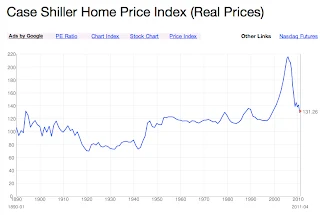Critical listeners to recent remarks I made
here on The Newsmaker Show with Kevin Doran will have wished that I had done a better job of explaining property taxes in the late 19th century and how their burden on property owners helped create the conditions which led to the tax reform which gave us the Income Tax in 1913.
So do I. Regrettably one can't say everything one needs to when trying to explain something else, especially like Herman Cain's 999 Plan.
If anyone gets the impression that I intended to say that the federal government routinely and directly taxed homeowners then, for example, in the same way homeowners are so taxed today on their property, that would be a mistake, but one which could easily be inferred. The federal government did do that sort of thing three times in the 19th century, but only for very brief periods and only to fund wars: in 1798, 1812 and 1861. Which is not to say there weren't other attempts, notable in the Pollock decision in 1895.
To a considerable extent, however, I have found that the terms "property tax," "excise," "tariff," "ad valorem" and the like get used interchangeably, and confusingly, in discussions about taxes both then and now. We would be better served if we were all more precise in these matters, but even supposed experts talk about this period with such imprecision sometimes that it is difficult to know exactly what people really do mean.
For example, "ad valorem" today gets used, as at usgovernmentrevenue.com, as a category under which to list excise taxes, tariffs, property taxes, etc., as opposed to income taxes, corporate taxes and social insurance taxes. In truth, however, its specific meaning has been more complicated than that.
From that characterization would not know that tax historians often distinguish personal property taxes in the first half of the 19th century as "in rem" from real property taxes in the second half as "ad valorem."
In the case of the former, as in 1798, slaves, for example, were taxed for war preparations with France as personal property. It didn't matter, however, how much one had invested to purchase the slave. Each one was simply taxed at 50 cents. Similarly a tax assessor would count the windows on your house, your horses, your cows, chickens etc. (unless you hid them well) and total them up by kind and assess the appropriate tax, which inhered in the thing, "in rem," not in the value, "ad valorem."
The latter is how the federal government in the 19th century was able to get around the onerous requirements of apportioning direct taxation of property equally according to state population. Instead of the arduous task of trying to tax the whole general sum of an individual's wealth in every state on an equal basis, the value of beer, wine and liquor, for example, produced anywhere could thereby be taxed everywhere the same, proportionally according to its value. In this way there was no need to divide the necessary revenue to be raised according to the population of the individual state, since the basis was the same everywhere beer was sold.
Such taxation is often called an excise, generally understood to fall on domestic produce. We still pay excises to this day, for example everytime we fill up the gas tank, 18 cents on the gallon to the feds. In truth excises are just a special kind of sales tax. A tariff is similar, but taxes foreign imports.
When it comes to the problems of farmers in the late 19th century, who eventually made league with Prohibitionists to install the Income Tax in 1913, theirs was a two-fold problem. Not only did the cost of financing state government fall heavily on them because of property taxation in the state in which they lived, federal excises on their produce represented a double "property tax" whammy. Think tobacco excises.
Viewed from this perspective, government at all levels, it seemed, got them coming and going.
To his credit, Herman Cain is trying to imagine a world in which government gets it for a change, instead of the taxpayer. His way of trying to make that happen is to play human desire to consume off of human desire to avoid paying taxes, by making what we consume each and every day the scene of a skirmish in the battle for limited government, which cannot exist without self-restraint.

















